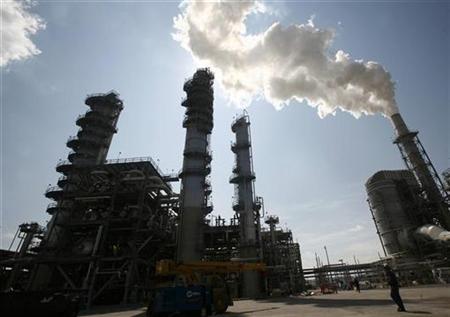Cap-and-Trade Support Hinges on Economy: Survey
Country: US
Author: Nick Zieminski

The Valero St. Charles oil refinery is seen during a tour of the refinery
in Norco, Louisiana.
Photo: Shannon Stapleton
NEW YORK - U.S. manufacturers would be much more likely to support cap-and-trade legislation to limit pollution if they believed the industrial economy was about to improve, according to a survey.
Opposition to the legislation to cut U.S. emissions of greenhouse gases, which suffered a delay in the Senate on Thursday, is strongest among industrial executives who are pessimistic about the U.S. economy, according to the survey commissioned by accounting and consulting firm Baker Tilly Virchow Krause, which represents many Midwestern manufacturers.
The telephone survey, conducted last month, found 55 percent of those bearish on the economy were strongly against the cap-and-trade system. That strong opposition dropped to 30 percent among those who are bullish about the economy.
Overall, 59 percent of manufacturers opposed the plan, in which companies would be required to buy credits for pollution they emit, while 32 percent were in favor, with large companies slightly more likely to be in favor than small ones. About a quarter of those surveyed are publicly traded.
U.S. business leaders prefer delaying legislation that would mean higher costs while they cope with the ongoing recession, said Brad DeNoyer, manufacturing industry leader at Baker Tilly.
"Manufacturing right now is working on razor-thin margins, so any additional costs will make the difference between being profitable and unprofitable," DeNoyer said.
HIGHER COSTS
Most of the 300 senior manufacturing executives polled said they would pass on the higher costs to their customers, and most would delay new capital investments.
"There's a general sense that something ought to be done," DeNoyer said. "Our clients are telling us they want to make sure that it doesn't cost too much and that the timing is right."
Last month, the U.S. House of Representatives narrowly passed its version of a bill to cut carbon dioxide emissions from 2005 levels 17 percent by 2020 and 83 percent by 2050.
But President Barack Obama's push for quick action on climate change legislation suffered a setback on Thursday when the U.S. Senate committee leading the drive delayed work until September. Democrats in U.S. coal-producing states worry about the impact on their economies, while Republicans see the bill as a tax increase.
One result of the delay may be a chance for manufacturers to learn more about how the legislation would affect them, which could raise opposition to it, DeNoyer said. The survey found 44 percent were either not too familiar or not all familiar with cap-and-trade rules.
Meanwhile, 42 percent said cap-and-trade would put them at a competitive disadvantage against overseas rivals. A majority said they would be more likely to support cap-and-trade if the same rules applied to overseas competitors.
© Thomson Reuters 2009 All rights reserved
